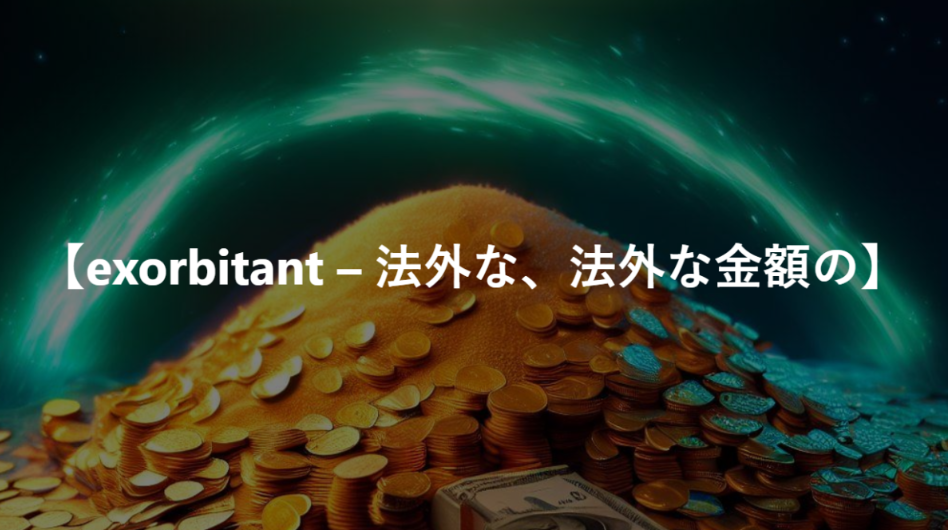語源・類義語・反対語・例文
【exorbitant – 法外な、法外な金額の -】という単語の語源とか由来を知っていますか?
「exorbitant」という単語は、ラテン語の「exorbitare」から来ています。これは「軌道を外れる」を意味し、「ex-」(外に)と「orbita」(軌道、道)という単語から成り立っています。元々は文字通りに天体が定められた軌道から外れることを意味していましたが、時間が経つにつれて、より比喩的な意味で「常識を逸脱する」、「法外な」など、通常や合理的な範囲を超えたものを指すようになりました。特に「exorbitant prices」(法外な価格)のように、非常に高い費用や価格を示す際に用いられるようになりました。
The word “exorbitant” originates from the Latin term “exorbitare,” which means “to deviate from the orbit.” It is composed of “ex-” (out of) and “orbita” (course, track). Initially, it literally referred to celestial bodies deviating from their designated orbits, but over time, it gained a more metaphorical meaning to denote exceeding the usual or reasonable boundaries. It especially came to be used to describe prices or costs that are extremely high, as in “exorbitant prices,” indicating amounts far beyond what is considered normal or reasonable.
この単語の類義語・反対語を教えてください。
類義語
- Excessive: 過度な。
- Steep: 急な、法外な。
- Inordinate: 過度の、異常な。
- Overpriced: 過剰に値段が高い。
- Expensive: 高価な。
- Outrageous: とんでもない、法外な。
- Pricey: 高価な。
反対語
- Reasonable: 合理的な。
- Affordable: 手頃な価格の。
- Moderate: 適度な。
- Economical: 経済的な。
- Inexpensive: 安価な。
- Cheap: 安い。
- Budget-friendly: 予算に優しい。
この単語に似た単語で間違いやすい単語はありますか?
- Orbitant: これは実際には正式な英単語ではありませんが、「orbit」(軌道)と「exorbitant」を混同して作り出されがちな語です。しかし、これは誤用であり、正しくは「exorbitant」です。
- Exuberant: 「元気な」や「豊富な」という意味ですが、発音が似ているために「exorbitant」と混同されることがあります。両者は意味が大きく異なります。
- Extortionate: 「法外な」という意味で、「exorbitant」と同義ですが、より犯罪や不正に近いニュアンスを持つことがあります。「extortion」(恐喝)と関連しているため、誤って使うと意味が変わってしまうことがあります。
この単語を使った例文を5つほど教えてください。
The hotel charged an exorbitant price for a simple cup of coffee.
(そのホテルは、普通のコーヒーに法外な価格を請求しました。)
The cost of housing in the city is exorbitant, making it difficult for many people to afford decent accommodation.
(都市部の住宅費は法外であり、多くの人々がまともな住居を手に入れるのが困難です。)
The airline tickets during the holiday season were exorbitant, causing many travelers to reconsider their travel plans.
(休日シーズンの航空券は法外であり、多くの旅行者が旅行計画を再考することになりました。)
The restaurant’s prices were exorbitant considering the portion sizes and quality of the food.
(そのレストランの料金は、料理のボリュームと品質を考えると法外でした。)
The repair shop quoted an exorbitant amount for fixing a minor issue with my car.
(修理工場は、私の車の小さな問題を修理するために法外な金額を提示しました。)
【exorbitant – 法外な、法外な金額の】のコロケーション
- Exorbitant prices: 「法外な価格」。商品やサービスの価格が通常や合理的な範囲を大きく超えている状態を指します。特に、消費者が不当に高いと感じる場合に使われます。
- Exorbitant fees: 「法外な手数料」。サービスや取引に伴う手数料が非常に高いことを示します。金融業界や教育機関などでよく使われる表現です。
- Exorbitant costs: 「法外なコスト」。プロジェクトや活動にかかる費用が過剰であるときに使用されます。経済的な観点から、予算を大幅に超過している場合に使われます。
- Exorbitant rent: 「法外な家賃」。住宅やオフィススペースの家賃が異常に高い場合に用いられます。特に、都市部や人気地域の不動産市場で見られる現象です。
- Exorbitant demands: 「法外な要求」。人々が非現実的または不当に高い要求をする時に使われる表現です。交渉や取引の文脈でよく使われます。
「exorbitant」とは、「法外な」や「非常に高い」という意味を持つ英単語で、通常の範囲や合理的な限界を大きく超えた金額を表す際に使用されます。この言葉は特に金銭的な文脈で頻繁に登場し、次のようなフレーズと共に使われます。
“Exorbitant prices”は、「法外な価格」という意味で、商品やサービスの値段が常識を逸脱して高い場合に使われます。消費者にとって不当に高価であることを示します。
“Exorbitant fees”は、「法外な手数料」と訳され、サービスの利用や特定の取引に関連する手数料が異常に高い状況を指します。この表現は、金融業界や教育機関で特に一般的です。
“Exorbitant costs”は、「法外なコスト」という意味で、何かを行うために必要な総費用が過剰に高いことを表します。特に予算を大幅に超過する場合に使用されます。
“Exorbitant rent”は、「法外な家賃」という意味で、住宅やオフィススペースなどの賃貸料が非常に高い状況を指します。主に都市部や人気がある地域での不動産市場で用いられる言葉です。
“Exorbitant demands”は、「法外な要求」と訳され、人々が非現実的または不合理に高い要求をしている時に使われます。交渉やビジネスの取引においてしばしば見られます。
これらのコロケーションを通して、「exorbitant」という単語がどのように使用されるかが理解できます。主に価格やコストが異常に高い状況を指摘する際に使われることが分かります。
“Exorbitant” is an English word meaning “outrageous” or “extremely high,” used to denote amounts that significantly exceed the usual range or reasonable limits. This word frequently appears in financial contexts and is used with the following phrases:
“Exorbitant prices” means “outrageous prices,” used when the price of goods or services is unreasonably high, deviating from common sense. It indicates that the cost is unjustifiably expensive for consumers.
“Exorbitant fees” translates to “outrageous fees,” referring to situations where the fees associated with using a service or conducting a particular transaction are abnormally high. This expression is especially common in the financial industry and educational institutions.
“Exorbitant costs” signifies “outrageous costs,” representing when the total expenses required to perform something are excessively high. It is particularly used when the budget is substantially exceeded.
“Exorbitant rent” means “outrageous rent,” referring to situations where the rental cost for housing or office space is exceptionally high. This term is typically used in the real estate market of urban areas or regions in high demand.
“Exorbitant demands” translates to “outrageous demands,” used when people are making unrealistic or unreasonable high demands. This is often seen in negotiations or business transactions.
Through these collocations, we can understand how the word “exorbitant” is used. It primarily points out situations where prices or costs are abnormally high.
exorbitantを使った文法問題
- The hotel’s _____ rates during peak season deterred many potential guests.
- (A) exorbitantly
- (B) exorbitance
- (C) exorbitant
- (D) more exorbitant
解答と解説: (C) exorbitant
解説: 空欄には名詞rates(料金)を修飾する形容詞が入ります。exorbitantは「法外な」という意味の形容詞です。
- The customer complained about the _____ price of the car repair.
- (A) exorbitantly
- (B) exorbitance
- (C) exorbitant
- (D) more exorbitant
解答と解説: (C) exorbitant
解説: 空欄には名詞price(価格)を修飾する形容詞が入ります。exorbitantは「法外な」という意味の形容詞です。
- The restaurant’s _____ prices for simple dishes led to negative reviews online.
- (A) exorbitantly
- (B) exorbitance
- (C) exorbitant
- (D) more exorbitant
解答と解説: (C) exorbitant
解説: 空欄には名詞prices(価格)を修飾する形容詞が入ります。exorbitantは「法外な」という意味の形容詞です。
- The company was accused of charging _____ fees for its services.
- (A) exorbitantly
- (B) exorbitance
- (C) exorbitant
- (D) more exorbitant
解答と解説: (C) exorbitant
解説: 空欄には名詞fees(料金)を修飾する形容詞が入ります。exorbitantは「法外な」という意味の形容詞です。
- The landlord’s demand for an _____ rent increase forced the tenants to move out.
- (A) exorbitantly
- (B) exorbitance
- (C) exorbitant
- (D) more exorbitant
解答と解説: (C) exorbitant
解説: 空欄には名詞rent increase(家賃の値上げ)を修飾する形容詞が入ります。exorbitantは「法外な」という意味の形容詞です。

